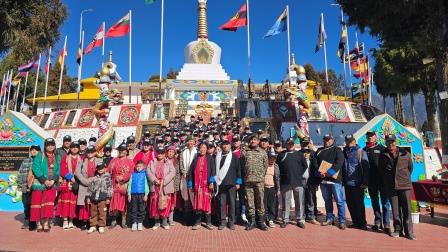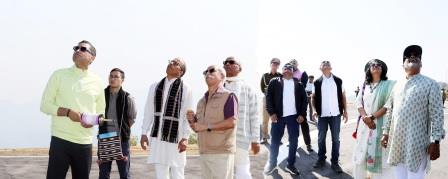-
Vacation ends in tragedy; two tourists die in frozen Sela…
-
Governor urges students to dream big, nurture positive…
-
Tourist from Kerala die in icy Sela lake, another…
-
Arunachal Pineapple Festival Bagra 3.0 kicks off
-
Indian Army organises ESM meet to commemorate Armed Forces…
-
 Veterans' Day celebrated with reverence and pride in Tawang
Veterans' Day celebrated with reverence and pride in Tawang
-
 Governor participates in kite-flying festival
Governor participates in kite-flying festival
-
Arunachal Pradesh set to receive 152 NCC Cadet Volunteers as…
-
Mein inaugurates hostel building at Pali Vidyapeeth, Announces support
-
State-Level Workshop on Career Guide Book and “My Career Advisor”…
Itanagar, Aug 22: The State Council of Educational Research and Training (SCERT), Itanagar successfully organised an orientation programme for teachers on Tribal/Third Languages, in line with the vision of the National Education Policy (NEP) 2020 which emphasises multilingualism and the promotion of mother tongue and regional languages in school education.
A total of 696 teachers from various districts of Arunachal Pradesh participated in the training, which was conducted in 17 batches between May 9 and August 22, with each batch receiving five days of training to ensure wider coverage and effective learning. The orientation was organised in collaboration with Community Based Organisations (CBOs), who facilitated the training of their respective languages, thereby strengthening the foundation of multilingual education in the state through both pedagogical support and cultural insights.
Teachers received training in Nyishi, Tagin, Galo, Apatani, Tangsa, Wancho, Aka (Hrusso), Kaman Mishmi, Taraon Mishmi, Singpho, Idu Mishmi, Adi, Tai-Khamti, and Tutsa.
This initiative reflects the state’s commitment to safeguarding and promoting the rich linguistic and cultural heritage of Arunachal Pradesh. By empowering teachers with orientation on tribal/third languages, the programme ensures that students get the opportunity to learn their mother tongue, thereby strengthening their connection to their roots and fostering pride in their linguistic and cultural identity.
Speaking on the occasion, Toko Babu, DC, ICR cum Director, SCERT, highlighted that the training will pave the way for effective classroom implementation of tribal languages as subjects and also contribute to the preservation of indigenous languages for future generations.
The orientation marks a major step towards aligning classroom practices with the NEP 2020 vision, which advocates multilingual education as a means of not only enhancing learning but also celebrating India’s cultural and linguistic diversity.

Kenter Joya Riba
(Managing Editor)She is a graduate in Science with post graduation in Sociology from University of Pune. She has been in the media industry for nearly a decade. Before turning to print business, she has been associated with radio and television.
Email: kenterjoyaz@easternsentinel.in / editoreasternsentinel@gmail.com
Phone: 0360-2212313

